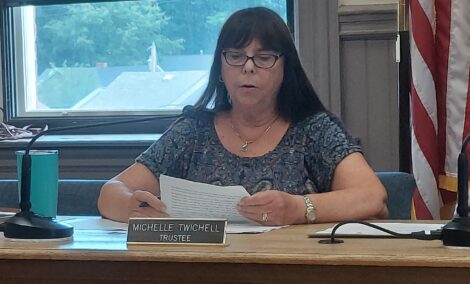Borrello Opposes Faculty On Community College Boards
Legislation that recently passed the state Senate would place a faculty member in a non-voting position on Community College boards.
State Sen. George Borrello, R-Sunset Bay, doesn’t think it’s a good idea. He’s not alone in his opposition; nine other Republican senators also voted against S.4685A. Sponsored by Sen. Toby Stavitsky, the legislation would amend Section 6306 of the state Education Law to expand, from 10 to 11, the number of community college trustees. The amendment provides that the 11th member be elected by and from among the faculty and staff of the college as an ex-officio and non-voting member.
Borrello recently debated the bill with Stavitsky on the Senate floor before Borrello said his opposition comes from inviting staff members into the closed sessions where such matters as staff compensation, hiring and firing are conducted. Borrello said that can be especially difficult since New York state negotiates staffing contracts and state aid to community colleges with local boards then figuring out how to live within those constraints. Borrello said he appreciates Stavitsky’s intent, but thinks there is too great a conflict of interest by having a staff member on community college boards.
“I think the issue I have with this is that our SUNY college campuses, whether they’re four-year or two-year, they have a lot of strains right now,” Borrello said. “They’re losing student population and one of the biggest challenges they had as being able to pay their staff. Somehow here in Albany we negotiate the contracts, then we go back to our SUNY campuses and say, ‘OK, now you got to pay for it. Figure out a way to pay for it.’ Now we’re going to add to the Board of Trustees someone who is part of that compensation package.”
Stavitsky wrote in her legislative memorandum that Community College board members, including the faculty or staff and student (member) are subject to the state Public Officers’ Law, which provides a variety of misdemeanor penalties that include suspension, firing and fines. Stavitsky reiterated that point during her debate with Borrello while making the argument that adding a faculty member to community college boards increases inclusiveness on local boards.
“We already have a student non-voting member of the community college and this applies only to the 30 or so SUNY community colleges,” Stavitsky said. “Secondly we recently added the position of president of the University Faculty Senate to the SUNY trustees, again, as a non-voting member. This is part of the policy of inclusiveness and the faculty member chosen by the faculty in the staff would be a non-voting member …We are just trying to level the playing field and include as many people as possible. We’ve never had a problem with some conflicts of interest and I don’t anticipate there will be any problems now because, quite frankly, the penalty is rather stringent.”





